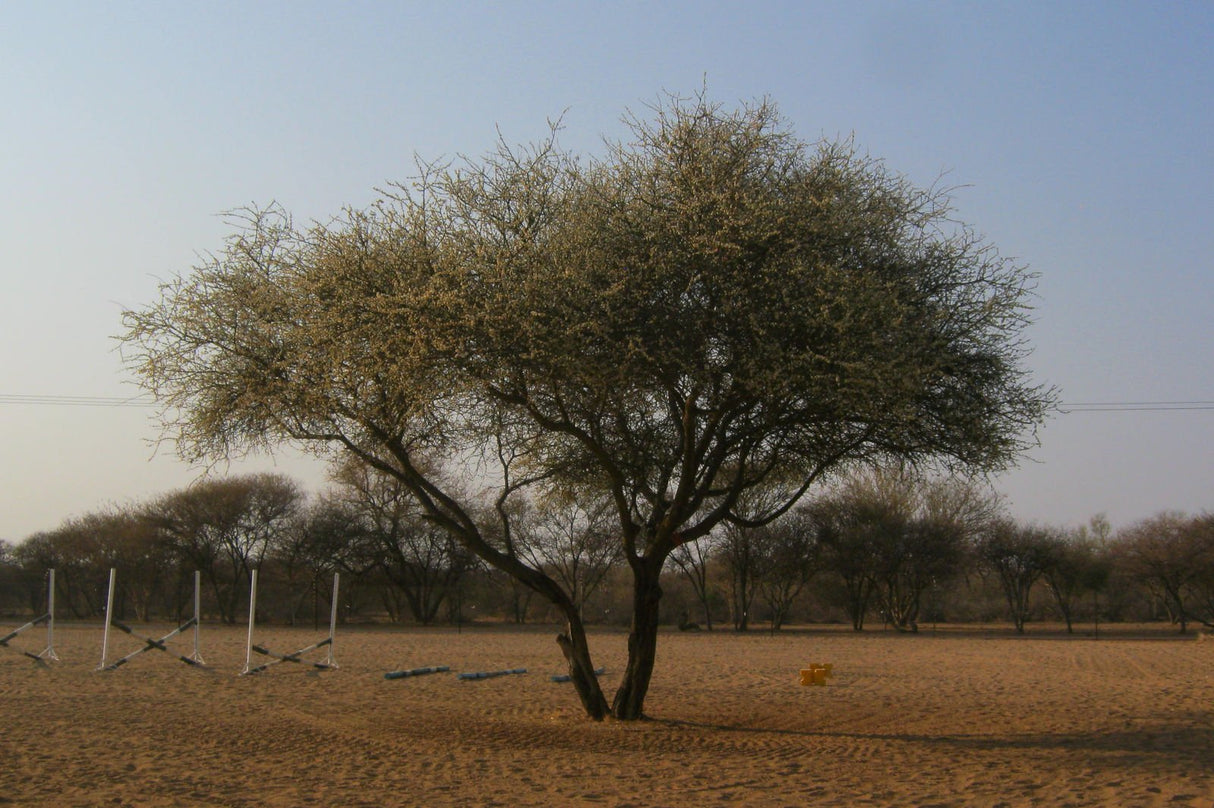Description
Description
The Acacia mellifera, commonly known as the Black Thorn Tree, is a hardy, deciduous shrub or small tree native to arid and semi-arid regions of Africa. It is recognized for its dense, thorny branches, small feathery leaves, and fragrant creamy-white flowers that bloom in clusters during the wet season. Growing up to 5–7 meters, it is an excellent choice for windbreaks, erosion control, and wildlife habitat in harsh climates.
Adapted to extreme conditions, the Black Thorn Tree provides forage for livestock, nectar for bees, and serves as an essential component of ecological restoration projects.
Specifications:
- Height: 5–7 meters
- Width: 3–5 meters
- Native to: Africa
- Foliage: Small, feathery, bipinnate leaves; deciduous
- Growth rate: Moderate
Conditions:
- Soil: Thrives in well-drained, sandy, or loamy soils; tolerates poor, rocky, or saline soils
- Light: Full sun
- Water: Low; drought-tolerant once established
- Climate: Arid and semi-arid regions; tolerates extreme heat and dry conditions
Additional Features:
- Flowers: Fragrant, creamy-white flower clusters that attract bees and other pollinators
- Uses: Ideal for windbreaks, erosion control, firewood, and forage; valuable in agroforestry systems
- Spacing: Plant 2–3 meters apart for hedges or erosion control; 5 meters for standalone trees
- Low Maintenance: Requires minimal care; pruning may be needed to control size or shape
- Pest Resistance: Naturally resilient; monitor for pests like borers in stressed trees
- Wildlife Attraction: Provides nectar for bees and shelter for birds and small mammals
- Cultural Value: Used in traditional medicine and as a source of tannins
The Black Thorn Tree is a resilient and multi-functional species, ideal for sustainable landscaping, ecological restoration, and supporting biodiversity in challenging environments.
Delivery Information
Delivery Information
We offer flexible delivery options to ensure your tree arrives in perfect condition, whether you're located nearby or on the other side of the world.
- Domestic Deliveries:
We provide reliable delivery services across the country, utilizing our fleet of specialized trucks and train freight networks. Whether you're in a metropolitan area or a remote location, we ensure your trees arrive safely and efficiently. - International Deliveries:
For our global customers, we coordinate delivery via sea freight. With 30+ years of exporting experience, every tree is carefully prepared to meet international biosecurity standards and packaged for safe transport to its destination.
Our team will work closely with you to arrange the most suitable delivery method based on your location, project timeline, and tree size. No matter where you are, we ensure a seamless delivery experience.
Have additional questions? Contact us to discuss your specific delivery requirements!
FAQ's
FAQ's
How are ex-ground trees prepared for delivery?
All ex-ground trees are carefully dug with their rootball intact to preserve the root system and minimize transplant shock. Each tree is stabilized and treated with specialized solutions to promote health during transit. The rootball is wrapped to retain moisture and protect it from damage, and water crystals are added to provide essential nutrients and hydration for the journey. These meticulous preparations ensure your tree remains healthy and ready for planting, whether it’s traveling across the country or overseas.
How long does delivery take?
Delivery times vary depending on your location and the size of your order. Domestic deliveries typically take 1–2 weeks, while international shipping may take several weeks depending on the destination. Contact us for specific timelines.
Are there minimum order quantities for delivery?
For local and nationwide orders, there are no strict minimums, though delivery costs may vary based on order size. For international orders, a minimum quantity is often required to optimize freight efficiency. Contact us to discuss your needs.
Do you provide installation services?
While we focus on the supply and delivery of trees, we can connect you with trusted landscaping partners who specialize in tree installation and site preparation.
Can I visit your farms to select trees?
Yes, we welcome visits to our farms by appointment. Seeing the trees in person allows you to select the perfect specimens for your project. Contact us to schedule a visit.



 Inspection available upon request
Inspection available upon request
 Photos are of example stock
Photos are of example stock
 International Delivery Available
International Delivery Available
 Available For Export
Available For Export
